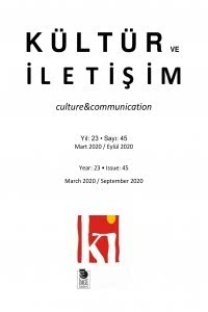New Information Technologies as "Innovations": The Case of Turkey
This paper is organized around the critique of "expectations" and ''indications" associated with new information and communicaiton technologies (ICTs). The notions of "expectation" and "indication" reflect a divided attitude endemic in the theory and research on ICTs. The social impact (of ICTs) research focuses on new technologies as entities inherent in the structural properties of social systems while the so-called intercultural research locate ICTs as elements external to the social systems. The former approach loads the signifier of ICTs with expectations while the latter registers them as mere indicators of modThis paper is organized around the critique of "expectations" and ''indications" associated with new information and communicaiton technologies (ICTs). The notions of "expectation" and "indication" reflect a divided attitude endemic in the theory and research on ICTs. The social impact (of ICTs) research focuses on new technologies as entities inherent in the structural properties of social systems while the so-called intercultural research locate ICTs as elements external to the social systems. The former approach loads the signifier of ICTs with expectations while the latter registers them as mere indicators of modernity. Through this division, communication theory fails to see the content of communicaiton that the new technologies enable subjects of the non-Western countries. With reference to C. Wright Milis' ''controversial" argument regarding the use of history, the concludes with the proposition that there is nothing "new" about the new technologies for countries like Turkey as they might very well be considered "novelties'' for the advanced capitalist countries
New Information Technologies as "Innovations": The Case of Turkey
This paper is organized around the critique of "expectations" and ''indications" associated with new information and communicaiton technologies (ICTs). The notions of "expectation" and "indication" reflect a divided attitude endemic in the theory and research on ICTs. The social impact (of ICTs) research focuses on new technologies as entities inherent in the structural properties of social systems while the so-called intercultural research locate ICTs as elements external to the social systems. The former approach loads the signifier of ICTs with expectations while the latter registers them as mere indicators of modThis paper is organized around the critique of "expectations" and ''indications" associated with new information and communicaiton technologies (ICTs). The notions of "expectation" and "indication" reflect a divided attitude endemic in the theory and research on ICTs. The social impact (of ICTs) research focuses on new technologies as entities inherent in the structural properties of social systems while the so-called intercultural research locate ICTs as elements external to the social systems. The former approach loads the signifier of ICTs with expectations while the latter registers them as mere indicators of modernity. Through this division, communication theory fails to see the content of communicaiton that the new technologies enable subjects of the non-Western countries. With reference to C. Wright Milis' ''controversial" argument regarding the use of history, the concludes with the proposition that there is nothing "new" about the new technologies for countries like Turkey as they might very well be considered "novelties'' for the advanced capitalist countries
Keywords:
Innovations, information technologies "expectations" and ,
___
- Appadurai, Arjun (2000). "Grassroots Globalization and the Research Imagination." Public Culture 12(1): 1-19.
- Başaran, Funda (2000), İletişim ve Emperyalizm Türkiye'de Telekomünikasyonun Ekonomi-Politiği. (Communication and Imperialism: The Political Economy of Telecommunications in Turkey) Ankara: Ütopya.
- Beltran, L. R. (1976). "Alien Premises, Objects and Methods in Latin American Communication Reseach." Communicaiton Research 3.2.
- Lerner, Daniel (1958). The Passing of Traditional Society: Modernizing the Middle East. Glencoe, Ili: Free Press.
- Mattelart, Armand and Michèle Mattelart (1998). letişim Kuramları Tarihi (Histoire des Théories de la Communication). Trans. Merih Zilboglu. Istanbul: iletişim.
- Mills, C. Wright (1980). The Sociological Imagination. Harmondsworth, Middlessex: Penguin Books.
- Nordenstreng, Kaarle and Herbert L. Schiller (eds.) (1979), National Sovereignity and International Communication. Ablex Publishing.
- Rogers, Everett (1962). Diffusion of Innovations. Glencoe, III: Free Press.
- Shields, Peter and Rohán Samarajiva (1993). "Competing Frameworks for Research on Information Communication Technologies and Society: Towards a Synthesis. Stanley Deetz (ed.). Communication Yearbook 16. Newbury Park: Sage. 349-380.
- ISSN: 1301-7241
- Yayın Aralığı: Yılda 2 Sayı
- Başlangıç: 1998
- Yayıncı: İmge Kitabevi Yayınları
Sayıdaki Diğer Makaleler
How To Straighten a Crooked Timber
Why Does Ideology Still Matter in Social Studies?
Olympic Dreams: Representations of Aborigines in the Australian Media
Turkish Broadcasting Policy in a Historical Context: Continuties and Discontinuties in the 1990s
Media Policies in Turkey Since 1990
Can Media Policy do Without "Culture" and "Society"?
